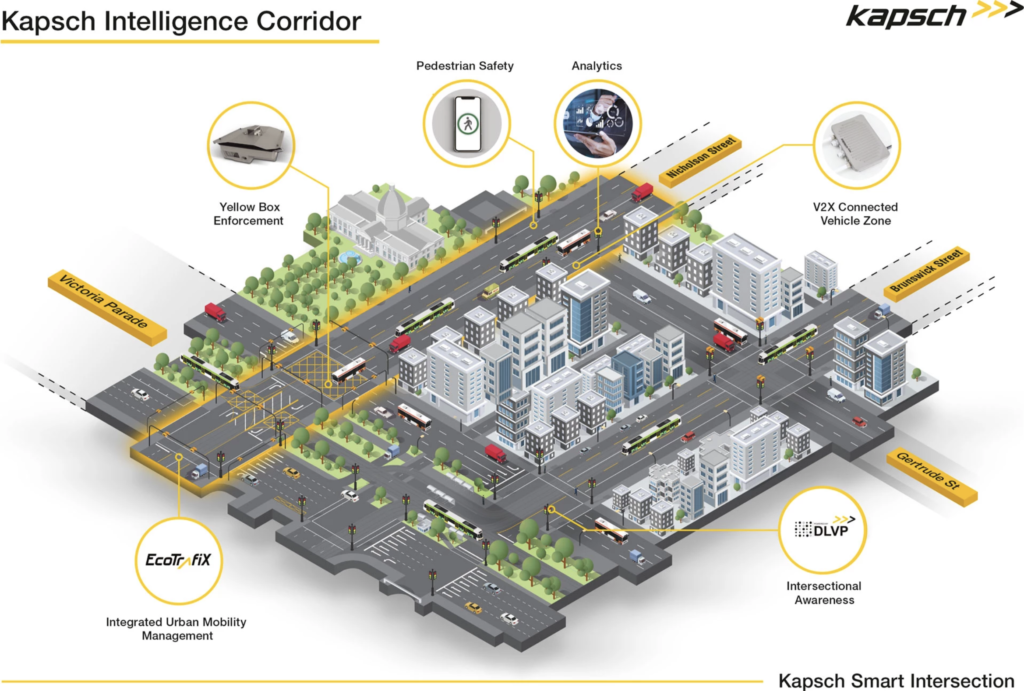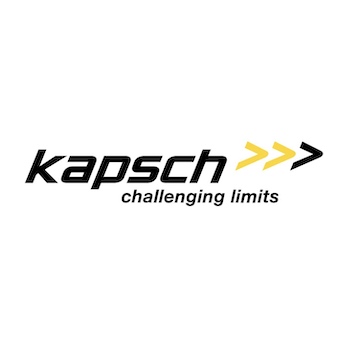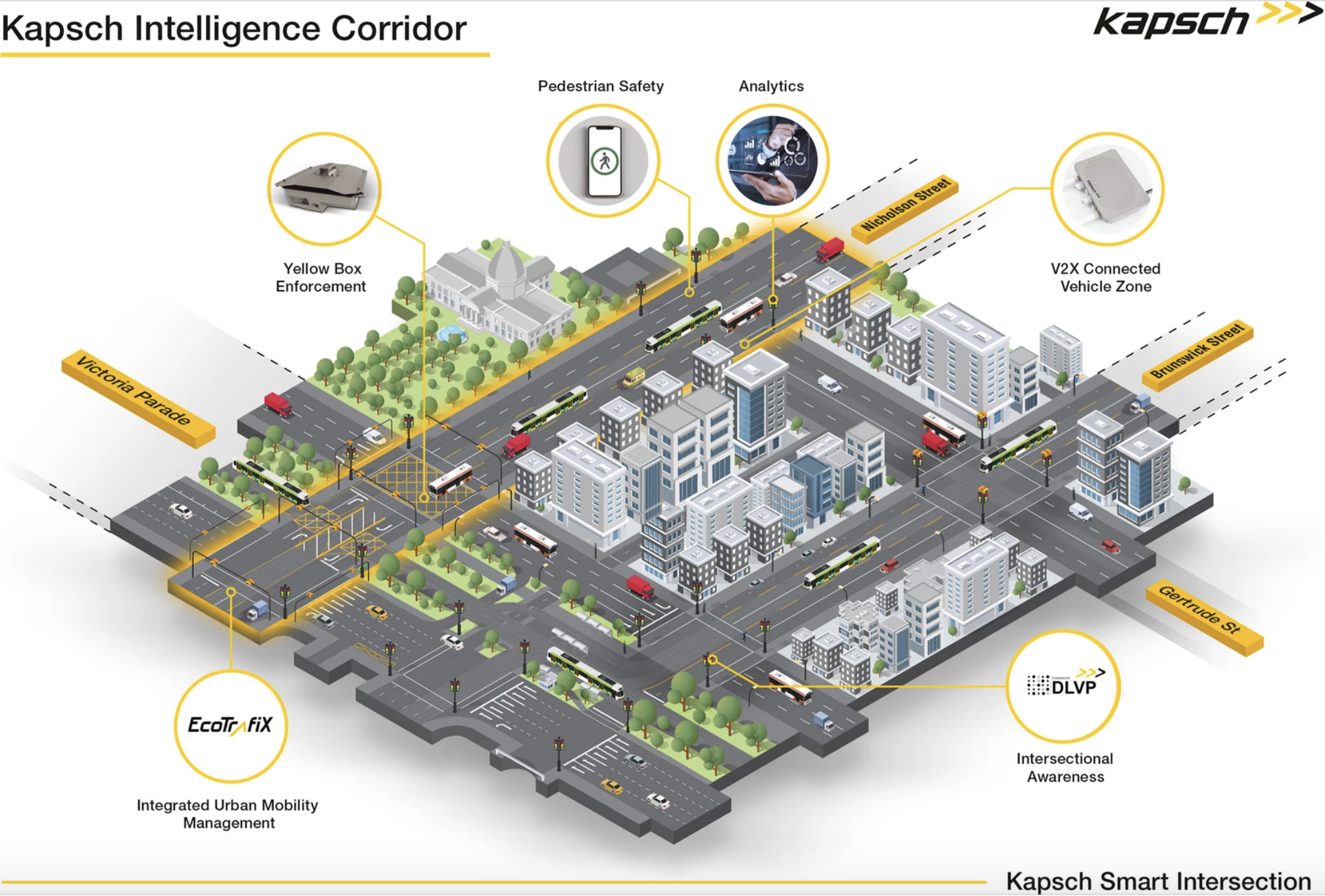World’s Smartest Traffic Management System Launches in Melbourne
One of Melbourne’s busiest roads will host a world-leading traffic management system using the latest technology to reduce traffic jams and improve road safety.

The ‘Intelligent Corridor’ at Nicholson Street, Carlton will be launched by the University of Melbourne, Austrian technology firm Kapsch TrafficCom and the Victorian Department of Transport.
Covering a 2.5 kilometer stretch of Nicholson Street between Alexandra and Victoria Parades, the Intelligent Corridor will use sensors, cloud-based AI, machine learning algorithms, predictive models and real time-data capture to improve traffic management – easing congestion, improving road safety for cars, pedestrians and cyclists, and reducing emissions from clogged traffic.
Leveraging different types of traffic sensors already installed by AIMES, the team will fine-tune the Intelligent Corridor over the next three years. The sensors will connect and monitor all parts of the transport environment. Safety metrics will be incorporated in real-time control of traffic signals, derived from traffic safety software developed by Advanced Mobility Analytics Group.
AIMES (Australian Integrated Multimodal EcoSystem) is the world’s first and largest ecosystem for testing emerging connected transport technologies at large scale in complex urban environments. It incorporates over 100 kilometers of road network in Melbourne, bounded by Lygon and Hoddle Streets, and Victoria and Alexandra Parades and receives support from the Victorian Department of Transport.
The Intelligent Corridor marks a significant new phase, providing a new level of monitoring, with sensors on every intersection and a host of initiatives that will create a world-leading traffic management system.
AIMES Director and Professor of Transport Engineering at the University of Melbourne, Professor Majid Sarvi said the Intelligent Corridor will provide a model for cities around the world to reduce the costs of urban congestion. Urban congestion costs the Australian economy $16.5 billion in travel delays every year, according to Infrastructure Australia’s Infrastructure Audit Report 2019.
Professor Sarvi, AIMES Director and Professor of Transport Engineering at the University of Melbourne, said:In Melbourne alone, 492 people lost their lives in crashes at urban intersections – with more than half of these being pedestrians, cyclists or motorcyclists – between 2006 and 2019. Our Intelligent Corridor will use the latest technology to better manage traffic and make our roads safer for everyone.
The project will collect before-and-after data to demonstrate the Corridor’s effectiveness. Its performance will be fine-tuned to improve outcomes on an ongoing basis over the next three years, thus providing important evidence for implementation in other cities.
The Intelligent Corridor will use global technology firm Kapsch TrafficCom’s corridor management platform EcoTrafiX.
TrafficCom Executive Vice-President for Asia Pacific, Matthew McLeish, said:From connected vehicles to autonomous driving to integrated mobility management, this technology is laying the groundwork for a sustainable and congestion-free future, utilizing the very best in multi-modal demand management technologies such as the Kapsch EcoTrafix platform.
Director of Signal Services with the Victorian Department of Transport Niloo Karimi, said the Intelligent Corridor was an important and exciting step for Melbourne.
Ms Karimi, said:The City has faced an increasing volume of road users over the past few decades, leading to delays and an increasing number of accidents. Now, academic researchers, industry and government will draw on connected transport technology to explore better outcomes and solve issues of safety and congestion to create a safer, cleaner and smarter transport future for Melbourne.
The Intelligent Corridor is supported by a $2 million Australian Research Council (ARC) Linkage grant, with contributions from the University of Melbourne and industry partners Kapsch TrafficCom and Advanced Mobility Analytics Group.
ARC Acting Chief Executive Officer Judi Zielke, said:The University of Melbourne, Kapsch TrafficCom and the Department of Transport Victoria, through their cooperation and linkages across disciplines, have taken an idea to reduce traffic congestion to a real-life, real-time application.
You can find more information on the Intelligent Corridor and the AIMES project here:
This article was originally published by Kapsch TrafficCom AG.















